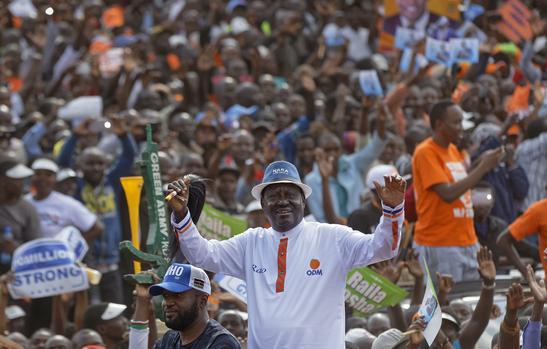Kenya’s Odinga enigmatic on 1982 coup attempt
August 7, 2017

Raila Odinga, the opposition leader who wants to be Kenya’s next president, says he’ll fight corruption and ethnic divisions. Yet he is also an enigmatic figure who was allegedly involved in an Aug. 1, 1982 coup attempt that exacerbated tensions in a country whose democracy remains vulnerable to ethnic feuding.
The fact that Odinga, in a tight race with President Uhuru Kenyatta ahead of a Tuesday vote, has stayed at the forefront of Kenyan politics despite his association with the botched uprising testifies partly to his political resilience and popularity among many poor people, as well as the loyalty of his Luo ethnic group.
Odinga has seemed ambivalent about his purported role in the revolt, a sensitive subject in Kenya 35 years later. People are concerned that the current election might turn violent, echoing deadly unrest that erupted after the 2007 election, and the 1982 coup attempt is another troubling example of how a country known for its relative stability in a sometimes turbulent region can unravel.
“A lot of people do not want to speak openly about it,” said Gitobu Imanyara, a lawyer who represented accused coup plotters. “It doesn’t receive sufficient scrutiny, even from political historians.”
The coup attempt happened a few years after the ouster of dictator Idi Amin in Uganda, to the east, while Marxist Ethiopia, to the north, was on the verge of famine. The thought that Kenya could spiral into military rule or civil war threatened to deprive the West of a reliable East African ally and scrap a sense of exceptionalism among Kenyans who took pride in their better circumstances.
“Kenyans tend to say: ‘Thank God that didn’t happen,'” said political analyst Abdullah Boru.
Chaos swept through the normally placid capital, Nairobi, in the days after the revolt, which started to fizzle within hours but unleashed a massive looting spree and ethnic-based violence.
It made a lasting impression on me, a teen in Kenya at the time. Memories include bloody footprints in a ransacked shoe shop whose display windows had been smashed; rounding a street corner on foot with my mother and stumbling across government soldiers taking cover as they closed in on a rebel or rebels holed up in a building; and ducking to the backseat car floor when shooting erupted at an intersection my father was approaching — he and many other civilian drivers reversed at high speed, away from the danger.
Coup plotters seized the Voice of Kenya, the state broadcaster, and other key sites in early morning raids and they had the support of some university student activists. But the ringleaders were mostly junior officers who did not convince air force pilots to bomb Moi’s official residence and loyalist forces quickly asserted control. By some estimates, several hundred people died.
While some coup leaders in the military were eventually convicted of treason and executed, the names of Raila Odinga and his father, opposition leader Jaramogi Oginga Odinga, came up during interrogations of some suspects.
Raila Odinga was accused of treason, and though the charge was later dropped, he spent much of the next decade in detention. His father was placed under house arrest. The younger Odinga has described the harsh conditions of imprisonment and alleged torture, including an assault by a police officer who hit him with a wooden table leg, infuriated by Odinga’s denials that he planned the coup.
Odinga, 72, has written that he was involved in educating and mobilizing people to bring about change in Kenya at the time of the coup attempt, but did not advocate violence. At the same time, he has been described as coy for suggesting several years ago that Kenya still lacked freedom of expression and was not ready for the truth about the events of 1982.
“His role has not been authoritatively proven,” said Boru, the analyst. “But because some of the main players were people from his ethnic group, it was like a fait accompli that he was part of it.”
In a Daily Nation article earlier this year, writer Kamau Ngotho described the view that Odinga is “many personalities all wrapped in one” and said he learned something new about the opposition leader every time they met.
“Mr. Odinga, this is the 10th anniversary of the 1982 coup attempt: Did you play any role in the coup?” Ngotho recalled asking in 1992.
“After a long pause, he replied: ‘Well Kamau, let’s pass that question for now.'” Ngotho wrote. “After another pause he said: ‘You know at this juncture I don’t want to tell the truth or lie to you, so let’s leave it.'”


